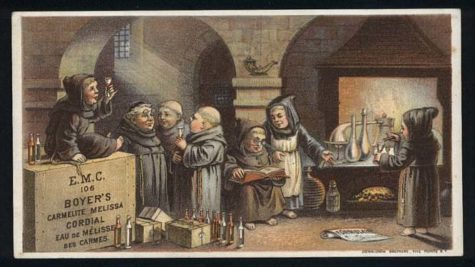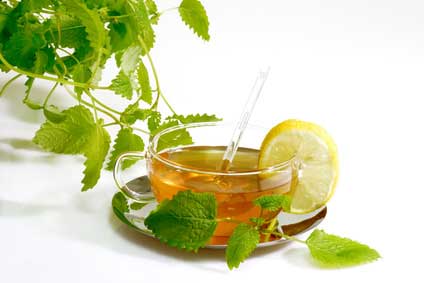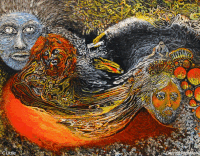Balm
Carmelite Water
The famous Carmelite Water, first made by 17th century Carmelite nuns was used to treat nervous headache and neuralgia. It combined lemon balm with lemon-peel, nutmeg, coriander and angelica root. Here’s a recipe:
Ingredients:
- 1 ¼ cups vodka
- 3 tablespoons dried angelica leaves, and stalks
- 3 tablespoons dried lemon balm leaves
- 1 tablespoon coriander seeds, bruised
- 1 nutmeg, cut into strips
- 2 tablespoons cloves
- cinnamon sticks
Instructions:
Pour the vodka into a jar. Add the remaining ingredients,cover tightly and shake. Leave in a warm place for three weeks, shaking every day. Strain into a sterilized bottle and store in a cool place. Use within six months.
Found at: Herbal Riot
Balm for the Flu
If you are not sure whether it`s a cold or flu coming on, don`t hesitate, infuse 1 oz of fresh or dried balm with a pint of boiling water and take it very hot, last thing at night. It will drive out a cold and arrest an attack of influenza – but you should take it in good time when you feel the first symptoms coming.
From: Gypsy Cures for Coughs and Colds
Note: as to exactly which balm plant this refers to is unclear to me, so I am sharing this definition of balm from Britannica.com. Be sure to research any herb before you use it.
Balm, any of several aromatic herbs of the mint family, grown for their fragrant leaves. The best-known balm plant is Melissa officinalis, also called balm gentle or lemon balm, which is cultivated in temperate climates and used as a scent in perfumery, as a flavouring in such foods as salads, soups, sauces, and stuffings, and as a flavouring in liqueurs, wine, and fruit drinks. Other common mint balms include bastard balm (Melittis melissophyllum); bee balm, or bergamot (Monarda didyma); richweed, or horse balm (Collinsonia canadensis); field balm, or creeping Charlie (Glechoma hederacea); lesser calamint, or field balm (Clinopodium nepeta); and Molucca balm, or bells of Ireland (Moluccella laevis). The use of balm in wine drinks and as a diaphoretic (induces heavy sweating) in medicinal teas can be traced back to ancient Greek and Asian cultures.
Saida: Salves To Heal Up Wounds
Brenda-Lee: Egg White Cough Cure
Pat Scott: Marsh Mallow Ointment
Sharon from Cleveland, Ohio: Egg White Cough Cure
Vagabond Witch: Soapwort Shampoo



